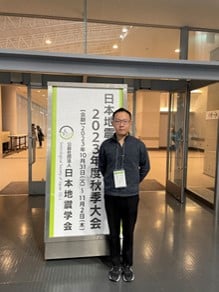
Journal Menu
► ▼ Journal Menu-
- Geosciences Home
- Aims & Scope
- Editorial Board
- Topical Advisory Panel
- Instructions for Authors
- Special Issues
- Topics
- Sections & Collections
- Article Processing Charge
- Indexing & Archiving
- Editor’s Choice Articles
- Most Cited & Viewed
- Journal Statistics
- Journal History
- Journal Awards
- Society Collaborations
- Conferences
- Editorial Office
Journal Browser
► ▼ Journal BrowserNeed Help?
Announcements
7 February 2024
Interview with Dr. Yuchen Wang—Winner of the Geosciences 2023 Outstanding Reviewer Award
Recently, we reached out to Dr. Yuchen Wang, a winner of the Geosciences 2023 Outstanding Reviewer Award, as we were eager to hear his perspectives on geosciences.

Dr. Yuchen Wang received his Bachelor of Science in physics from Peking University in 2016, his master’s degree in earth and planetary science from the University of Tokyo in 2018, and his Ph.D. in earth and planetary science from the University of Tokyo in 2021. From April 2019 to September 2021, he served as a Research Fellow DC1 of the Japan Society for the Promotion of Science (JSPS) and was a visiting student at the National Center for Integrated Disaster Management (CIGIDEN) in Chile.
Since October 2021, he has been a Young Research Fellow at the Japan Agency for Marine-Earth Science and Technology (JAMSTEC), with a focus on research areas such as earthquake tsunamis, meteorological tsunamis, data assimilation, and coastal disaster mitigation. He has published 34 peer-reviewed papers in journals such as Geophysical Research Letters and the Journal of Geophysical Research: Oceans, and Ocean Engineering. He has an h-index of 15 (according to Google Scholar statistics), and has served as a reviewer for 33 journals, including 10 MDPI journals.
The following is an interview with Dr. Yuchen Wang:
1. What are you currently researching and why did you choose this research field?
I am researching tsunamis. A tsunami is a series of ocean waves with extremely long wavelengths, caused by large-scale disturbances of the ocean, such as earthquakes, volcanic eruptions, and landslides. It can cause loss of life and damage to properties. Therefore, rapid and accurate early tsunami warning is essential for coastal disaster mitigation.
I attended a field trip to Fukushima Prefecture, Japan, when I was an undergraduate. I saw the ruins of the tsunami caused by the 2011 Tohoku earthquake. I was shocked by the destructive power of this natural disaster. After that, I decided to research tsunami science and became a graduate student at the Earthquake Research Institute, University of Tokyo.
2. Could you please introduce us to your research team, and how you came to the idea of becoming a scientist?
At present, I am working at the Japan Agency for Marine-Science and Technology, Research Institute for Marine Geodynamics, Research and Development Center for Earthquake and Tsunami Forecasting. The mission of our center is to develop technology for the real-time monitoring of crustal and seawater movements on the seafloor, and to make maximum use of these observation data to develop and implement a system for forecasting earthquakes and tsunamis. We conduct numerical simulations with an advanced supercomputer system—the Earth Simulator. We also participate in field surveys to look for tsunami deposits.
I believe that exploring a new field as a scientist is a very interesting thing. I hope to contribute to mitigating the disastrous effects of tsunamis through my own efforts.
3. We are an open access journal. How do you think open access impacts authors?
Open access allows authors to make their work freely available to anyone with an internet connection. This can lead to increased visibility and reach for their research, as it removes barriers such as paywalls, which restrict access to those who can’t afford it. More people can discover, read, and cite their work, potentially increasing its impact and influence in the academic community.
In addition, by making their work freely available, authors can attract more readers and potential collaborators, leading to increased citations and recognition within their field. Open access articles may receive more citations than articles hidden behind paywalls.
In fact, an increasing number of traditional journals are also transitioning to open access. It could be a trend.
4. Could you please share with us your experience of being a reviewer for Geosciences?
I have been reviewing for Geosciences since 2022. It is a good journal with high-quality articles. I mainly handle reviews in the field of tsunamis but also deal with giant earthquakes and storm surges. As a reviewer, I usually provide my review within a week. On the one hand, I give authors appropriate suggestions for revisions; on the other hand, I also ensure strict quality control for the journal. During the peer review process, I am also able to stay updated on the latest research advancements, especially regarding non-seismic aspects of tsunamis. Additionally, the publishing process is very efficient, which is a great help to authors. Over the past year, I have reviewed a total of seven articles for Geosciences, and I look forward to continuing to work with the journal in the future.
5. What qualities do you think reviewers need?
I believe the two most important qualities for a reviewer are expertise and objectivity. Firstly, reviewers should have expertise in a subject area that is relevant to the manuscript they are reviewing. This expertise allows them to evaluate the research methods, results, and conclusions critically. Secondly, reviewers should maintain objectivity and impartiality throughout the review process, regardless of personal biases or preferences. They should focus on evaluating the quality and validity of the research presented in the manuscript. In addition, I believe reviewers also need strong time management skills. They should be able to provide timely review comments while fulfilling their own research duties.



